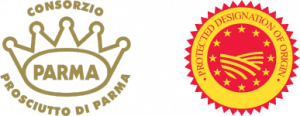TASTE THE DIFFERENCE

Prosciutto di Parma, also known as Parma Ham©, has been made using traditional methods perfected over centuries and dating all the way back to Roman times. To ensure you receive the best product, the Consorzio del Prosciutto di Parma oversees strict laws defining the ham’s quality and characteristics. In fact, the Parma Crown you see on every leg is the signature mark guaranteeing you and your customers receive genuine Prosciutto di Parma.
COMMON QUESTIONS AT THE DELI COUNTER
What is Prosciutto di Parma?
Prosciutto di Parma is an all-natural, gluten-free product free of preservatives and nitrates. It is made only from the hind legs of specially-bred pigs and sea salt.
Where is it produced?
Prosciutto di Parma can only come from the province of Parma in North-Central Italy, where unique microclimates and Mediterranean breezes combine to provide ideal conditions for curing meat.
How long is it aged?
Every leg of Prosciutto di Parma is aged for at least 400 days and up to 30 months. As Prosciutto di Parma ages, the flavor becomes richer, more complex and drier in texture.
Why is it pricey?
Prosciutto di Parma is a product of superior quality that is highly traceable throughout the entire production process, from the moment each pig is born. It is a traditional product that boasts a certified PDO (Protected Designation of Origin) status.
What differentiates Prosciutto di Parma from other cured hams?
The time-honored process for curing Prosciutto di Parma, setting it apart from other cured hams, begins with Parma’s unique terroir and Italy’s finest pigs. Pampered pigs are raised on a special diet that includes whey from Parmigiano-Reggiano production. Unlike other cured hams, Prosciutto di Parma has a more delicate flavor, is 100% natural and free of preservatives.
Is it salty?
The traditional curing process includes careful hand salting and long-term aging (more than most cured hams), contributing to Prosciutto di Parma’s less salty taste. On average, each ham is made up of only 5.3% salt. In fact, the product’s sweetness and nuttiness are signature flavors of its production.
How can I cook with it?
Prosciutto di Parma is delicious on its own, layered on bread, wrapped around seasonal fruit or on a charcuterie board. Quickly liven up a dish by dicing the end cut for pasta, spicing up a grilled cheese or topping a pizza. Pair it with craft beer, such as a white ale, or a fruity white wine.
A SLICE ABOVE THE REST
Cleaning and Preparation
1. Remove the ham from its Cryovac packaging.
2. Wipe away any grease from the leg.
3. Identify any areas that may have oxidized and
check for pockets of rancid fat (this does not mean the whole leg is tainted – only the immediate surrounding area) and trim them away.
Be careful to cut away only the skin of the area you plan to slice, making sure not to trim away too much of the fat to avoid impacting the flavour and your bottom line.
4. Prosciutto di Parma is meant to be served
with a ring of fat around each slice. Leave a layer of 1-1 ½ inch thickness. If customers prefer less fat, leave at least a ½ inch ring of fat – this lends essential flavour and helps keep slices fresh.
Slicing and Packaging
Always slice Prosciutto di Parma to order – never in advance.
Unless directly specified, it should be sliced paper thin – no more than 1/16th of an inch. Ideally, it should be translucent when held up to the light.
When packaging sliced product for customers, place slices side by side, slightly overlapping, and place paper in between layers to prevent them from sticking together
Thicker slices of ¼ inch are used when a recipe calls for diced or julienned pieces. Maximize your yield with the small end of the ham, which is ideal for this purpose and can be used in your prepared foods or wrapped and sold for soups and risottos.
Storing
A boneless Prosciutto di Parma can be stored in its vacuum pack up to 12 months, refrigerated at 40˚F to 42˚F.
1. Once the vacuum seal is broken and slicing
begins, the ham can be held under refrigeration up to 40 days. Freezing is not recommended.
2. After slicing, cover the cut surface tightly with plastic wrap and refrigerate.
3. Train employees to manage inventory in
your deli case to reduce loss and customer disappointment. Remove only one leg at a time and return it to the same location to avoid confusion with different ages of Prosciutto di Parma or with other prosciuttos.
Pre-Sliced Product
If you carry packaged pre-sliced products you can direct customers to Prosciutto di Parma by telling them to look for the gold Parma Crown located on a black triangle in the upper left corner of the package.
SLICING PROSCIUTTO DI PARMA

Prosciutto di Parma




